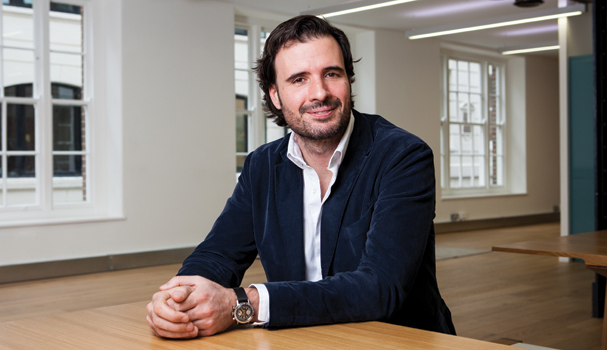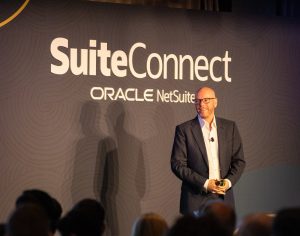Lopo Champalimaud is a man in touch with his feminine side. Though he seems an unlikely candidate to start a thriving company in the beauty industry, he gained an early insight into the needs of busy women from a young age. His mother, Alexandra Champalimaud, is a highly acclaimed interior designer who has her own firm based in New York.
“I really love strong women,” he starts. “For women especially, it’s a really hard balance to be career-driven, raise families, remain feminine and all of those different things you’re trying to do all at once. I wonder if it influenced the fact that I started a business that is female-dominated.”
After his parents’ divorce when Champalimaud was six, he moved from Portugal to Montreal with his mother, where she set up her interior design business. “She’s a real force of nature; she’s quite amazing. She’s very young – she had me when she was 20 – and she’s got this incredible drive.”
Champalimaud and his brother, six years his junior, grew up watching their mother build a business, “with all of its ups and downs. It’s not always been easy but she’s a real fighter.” Champalimaud jokes he knew “everything” about the business. “I knew the good clients and the bad clients and I knew the employees who were performing and those who weren’t.”
He started his first business months after finishing a degree in history and political science at McGill University in Montreal. His stepfather had given him a desk and a phone in his office in New York and Champalimaud was left to his own devices. He learned that a company his stepfather’s private equity firm had invested in was going out of business and one of its assets was the right to do internet market research.
“This was early 1994. There was no web, there was no browser. There was AOL and that was basically it from a consumer perspective,” explains Champalimaud. “I thought: ‘I know nothing about the internet, I definitely know nothing about market research but I think I want to start the world’s first online market research firm.” Soon after, he and three co-founders begun Cyber Dialogue, “the world’s first online market research company”, which later morphed into an online CRM business.
The company scaled fast as the dotcom bubble began to swell. In the spring of 1999, as headcount hovered around the 200-mark, the firm readied itself to list on the Nasdaq. “We were two weeks from going public. Everything was filed, all the paperwork was done – and then the market crashed. We ended up having an incredibly difficult year that year,” the entrepreneur admits. “We thought we were going to lose the business a couple of times.”
Incredibly, the business survived and in 2000 Champalimaud moved to London to oversee the firm’s growing European clientbase. After a few years in the capital and masterminding a turnaround to restore the company’s fortunes, he wanted out. He sold his shares back and left in 2003.
He didn’t have to wait too long for opportunity to come a-knocking. In 2004, Lastminute.com co-founder and Silicon Roundabout godfather Brent Hoberman offered him a job running lastminute.com’s lifestyle business. “Brent and one of my good friends had gone to university together. I’d talked to him a bit about my previous CRM business and we’d done a little bit of consulting work with lastminute.”

Champalimaud was experiencing something of a crisis of confidence. “At that point, I’d worked for myself all my professional life and it’d only been a modest success. I thought maybe I wasn’t designed to do this and perhaps I should go [and] try working for somebody else.”
There are worse people to work for than Hoberman when perfecting the craft of running internet start-ups. “I’ve got a huge amount of respect and admiration for Brent.” And though he describes his time at lastminute.com as a “great experience”, it soon became apparent Champalimaud’s calling was to start another business himself. “I loved it. We did a really good job, it grew incredibly quickly; when I left it was probably 50% of the business in terms of orders sold. And we built a great team.”
After a long day at the office, Champalimaud tried to book a massage. When internet searches, email exchanges and phone calls to salons proved fruitless, he gave up. “It was such a rigmarole that by the time I got to the end of the search I actually didn’t want the massage any more,” he recounts. “It dawned on me that you book everything online – you book your flights, your cars, your hotels, your dating life – but you don’t do your hair and beauty.”
What’s more, the hair and beauty industry was crying out for transformation. Not only was it a “large, fragmented marketplace”, which would benefit from an aggregator or marketplace, but local salons were struggling to haul themselves into the 21st century and wean themselves off antiquated booking systems.
As Wahanda launched on Valentine’s Day 2008, Champalimaud had something to prove. “I felt like [I was] the only guy who’d been in the internet world, pre-internet stage, who hadn’t had a home run. I felt like, ‘what’s wrong with me?’”
Though he was modest about his success to-date, investors were in no doubt as to his credentials as they lined up to invest in Wahanda, which he billed as “the OpenTable for spas and salons”. The initial £1.5m, a pretty punchy seed round by anybody’s standards, was raised “on the back of a PowerPoint presentation. We didn’t have anything to show them. We had a team – we had four people – and we had a business plan. That was it.”

It was clearly enough to persuade investors to part with their cash. One anonymous investor backed Champalimaud from the get-go – without knowing a thing about his new venture. “We had one investor in particular who’s a big US billionaire and had invested in my previous business. He came to London and we went out for dinner. He said to me, ‘Lopo, what are you doing next?’ I said, ‘I’m working on a new idea,’ and he said, ‘great, I’d like to invest.’ I said, ‘I haven’t told you what the idea is yet,’ and he says, ‘it doesn’t matter, I’m in’.”
He was ‘in’ to the tune of $1m (£650,000). “It was an incredible privilege but I also felt a huge amount of responsibility as a result,” admits Champalimaud. “I asked him much later on, ‘why did you do that?’ And he said, ‘there’s nothing else but people. If you believe in a person, that’s it.’”
The American billionaire was just one of a handful of high-profile investors. Other familiar faces amongst those who put in seed capital are Brent Hoberman, Stefan Glaenzer and Wolf Hengst, the former head of operations at Four Seasons.
Though Champalimaud’s general approach is to “take as much money whenever it comes to you”, he rejected investment from “one of the world’s biggest VCs” during that seed round in 2008. “We said no, not because we didn’t think they were amazing and not because we didn’t like the team, but [because] we felt like we were a small bet. Basically they were putting a little bit of seed money in and unless we were an absolute home run, an absolute knock-it-out-of-the-park from day one, they probably weren’t going to follow their money.” In other words, if they chose not to invest again, it would send a negative message to the rest of the investor community. “If one of the top VCs in the world doesn’t follow their money at that point it’s very hard for any other investor to go against that.”
Champalimaud was able to make such informed decisions because of his previous experience with investors, he says. “There’s no question that was a function of experience. Businesses in the internet space are momentum businesses and there are a lot of really good companies out there that have taken longer or have stumbled somewhere in the middle. You want investors that really understand the business.”
It may have taken a little longer than he’d hoped (“I should be retired on my yacht,” he jokes,) but seven years in, Wahanda has begun to build real momentum. After a drastic decision to turn off the daily deals side of the company, Wahanda’s core business is now predicated on it providing salons and spas with its booking technology and listing them on its site and app. In return, Wahanda takes a 20% commission on any treatments booked through the platform. It’s growing rapidly with 800 new salons and spas signing up a month. He says 10,000 are now listed in total.

Its acceleration since 2013 has been partially fuelled by three acquisitions. The first, Salonium, was a Lithuanian company of four that built booking software for the spa industry; the second, Salonmeister, was a German rival Champalimaud snapped up in October 2014, and the most recent in January this year, Lemon Labs, is a Lithuanian mobile-development firm.
The addition of Lemon Labs has further bolstered Wahanda’s development team. Despite having only launched its first app in March 2014, the company is now focusing on mobile-first strategy. This has been driven by consumer behaviour, says Champalimaud. “Our business today is 40%-plus mobile.” And it’s growing fast. “We believe that this business will be 80-90% mobile in the next year to year and a half. Mobile really is going to be the predominate platform for us going forward.”
The other tenet to Wahanda’s growth strategy is aggressive overseas expansion. Between now and June of this year, it plans to enter six new European markets: France, Spain, Italy, Austria, Switzerland and Ireland. It already has a significant presence in Germany, thanks to the Salonmeister acquisition last year. “When we acquired them, they were 20 people or so. They’re now almost 70.”
Champalimaud hints that further European acquisitions may be on the cards. “The tough thing about our business is that it’s a very local business so when we go into a new market there’s only a few things I can do: I can provide capital, I can provide technology and I can provide operating excellence and know-how. But ultimately, I’m reliant on strong, local teams to execute,” he explains. “I’m trying to create a constellation of entrepreneurs who share the same vision, have that real independence, who have the ability to execute in their local markets – but do it in a very co-ordinated, very structured, very unified way.”
This all makes for a crowded schedule for Champalimaud – he rarely gets home in time to tuck in his two-year old daughter – but he acknowledges that short-term sacrifices are necessary in the pursuit of longer-term success. “There are certain phases – like right now – where it’s full-on and work demands more than it probably should an ongoing basis. Over time it evens out. You’ve got to believe it’s in phases because [this pace] isn’t sustainable forever.”
The entrepreneur avoids burning out by “protecting his weekends where possible” and keeping physically fit – he’s an avid cyclist, runner and skier. “I’m very active from a sports perspective; that’s really important to me,” he says. “I tell my team, ‘this is not a sprint, it’s not even a marathon; it’s an iron man’. So you’ve got to pace yourself and have those moments of recharging. They’re really important.” ![]()
Share via:


















































